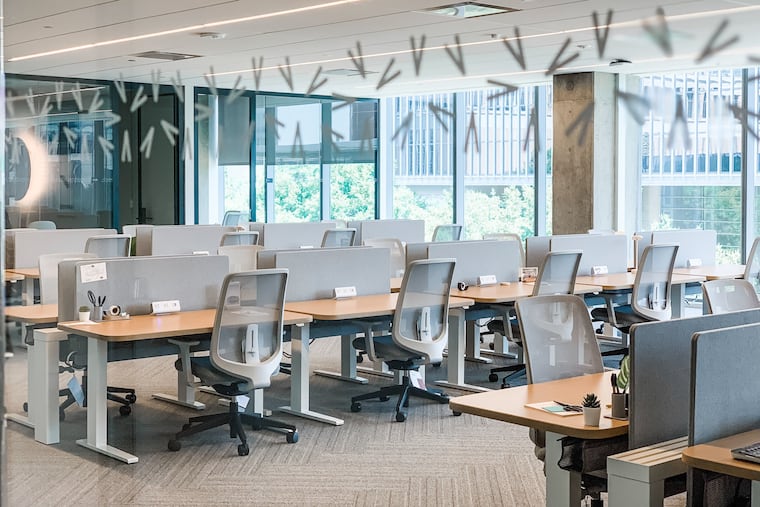Real estate giant CBRE to open first Northeast U.S. location of coworking spinoff in Philly
CBRE began rolling out its Hana-branded spaces nearly a year ago as a way to partner on flexible-space ventures with landlords who are looking to claim for themselves a bigger piece of shared-office market.

The global commercial real estate firm CBRE is teaming with the owner of the 1818 Market St. office tower on two stories of shared space at the Center City high-rise that would compete with the likes of WeWork.
The 50,000-square-foot coworking space, which is set to open during the last three months of 2020, is the seventh to be announced under CBRE’s Hana brand of collaborative offices and will be its first to open in the Northeastern United States.
CBRE began rolling out its Hana-branded spaces nearly a year ago as a way to partner on flexible-space ventures with landlords seeking a bigger piece of the shared-office market. Control of the space now mostly goes to traditional coworking operators.
Hana locations have since opened in Dallas and London, with additional ones planned in areas including Irvine, Calif., and Arlington, Va. The Philadelphia space will be operated in a venture with Shorenstein Properties, the San Francisco-based owner of the 37-story 1818 Market building.
Hana chief executive Andrew Kupiec said Monday that the brand was drawn to Philadelphia by the city’s growing commercial activity. But the main enticement was the opportunity to collaborate with Shorenstein, which has a nationwide portfolio of high-end office buildings where Hana hopes to open locations.
“We’ve looked at this as an opportunity to get in early and work with Shorenstein and expand in their portfolio,” Kupiec said.
Central Philadelphia has about 1.3 million square feet of shared office space, led by WeWork with 194,000 square feet in five locations, according to data from the real estate services firm JLL. But that represents only about 1% of the city’s total office inventory, a far smaller proportion than most other big markets.
Lauren Gilchrist, JLL’s head of research for the Philadelphia region, said there’s enough demand in the city for “quality office space, available on demand” to sustain additional growth.
Most of Philadelphia’s existing coworking inventory, however, follows a subleasing model, where operators fit out space they rent from landlords, so they can offer it to short-term tenants at marked-up rates.
Hana, by contrast, teams with landlords on coworking spaces within their buildings, which Kupiec characterized as “a more secure, overall more transparent model" that keeps property owners actively engaged with short-term tenants.
Alex Snyder, who analyzes coworking businesses at CenterSquare Investment Management in Plymouth Meeting, said Hana’s deals with office landlords seem analogous to agreements that are common between hospitality chains such as Hilton and hotel property owners. In those deals, hotel chains offer their branding and management services to owners in exchange for a fee.
This type of arrangement could be more favorable to office landlords than traditional coworking leases, since it lets owners claim a share of profits from shared office space in their buildings, rather than a set monthly rent, Snyder said.
“This much more closely aligns the interests of the landlord and the coworking provider,” he said. “You get a share of the upside.”
Another variation on the traditional coworking model in Philadelphia is offered by San Francisco-based LiquidSpace, which operates an online marketplace that allows landlords to list available office space to short-term tenants.
Philadelphia’s biggest office landlord, Brandywine Realty Trust, meanwhile, offers flexible office and meeting space under the brand name Bex in three of its buildings, in Center City, Radnor, and northern Virginia. Tenants in any of Brandywine’s dozens of properties have access to the space.
Mark Portner, managing director for Shorenstein’s Eastern U.S. investments, declined to discuss its partnership arrangement with Hana and would not contrast its approach with that of traditional coworking operators.
But he said he expects the 1818 Market offering to benefit from CBRE’s understanding of the market as one of the nation’s dominant commercial brokerages.
“They have a great window into tenants that may have a need for flexible workspace,” he said.